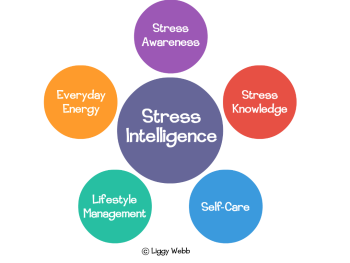5 ways to get the best sleep

I certainly know when I don’t get a good night’s sleep, I really struggle the next day and find it hard to focus and get on tops of things. It can make me feel irritable and every little task feels like a such a big effort. It also makes me feel less like exercising and reaching for quick fix sugary snacks and coffee, which in turn, have an impact on the next night’s sleep. It can be easy to get into a cycle of poor sleep and this can take its toll on our overall wellbeing and mental health. When it comes to coping well and managing stress, quality sleep is at the very core of our ability to be resilient.
Scientific research from various universities around the world has identified that lack of quality sleep can increase our risk of disease and elevate blood pressure. It can also have a very negative impact on our emotional well-being by exacerbating depression, triggering anxiety and amplifying irritability and mood swings. Given the current situation we are experiencing and the associated anxiety and information overload getting a good night’s sleep can be very challenging. So many people I speak to lately are struggling to get good quality sleep and feel that as a result they are not coping as well they could be.

Through research that I had done around sleep it is clear that every person is different in terms of the amount of sleep that they need and there is no magic number of hours set in stone. An increasing amount of studies have shown that the amount of sleep people actually need is unique to each individual. This will vary with age and also our level of activity and amount of energy we exert throughout the day.
How much sleep we actually need will also vary throughout our lifetime depending on our age and circumstances. It is important to identify how much sleep you personally require so that you can function at your best throughout the day. Personally, I just love a good eight hours!
Here a five ways to get the best rest and recharge so you can be on top form and better equipped to cope with what life brings your way throughout the day.

1. Create a sanctuary for sleep
Here are five useful tips to create an environment that is conducive for sleep
• Invest in a good quality mattress which will ensure your bed provides the correct support, comfort and space.
• Declutter your bedroom and keep it tidy. If you look at chaos before you go to sleep it will agitate you and create anxiety.
• Get a diffuser to create pleasant smells, such as lavender and geranium, which can be really soothing.
• Make sure that your bedroom is the right temperature, somewhere between 15.6 °C and 19.4 °C (60°F to 67°F) ideally.
• Block out any light as this is essential for sleep and the absence of light sends a critical signal to your body that it is time to rest. Light exposure throughout the night can lead to frequent and prolonged awakenings so invest in blackout curtains or blinds if necessary.
Ideally your bedroom needs to be somewhere that you associate with sleep. Wherever possible, remove distractions. It is far better to watch TV, check social media and eat in another room. This will allow you to fully relax
.
An increasing amount of sleep advice suggests keeping technology out of the bedroom altogether. The backlit ‘blue light’ displays on some gadgets suppress melatonin production which is the hormone that helps you sleep. The suppression of melatonin can cause sleep disruption during the night too so the sooner you switch off technology before you go to sleep, the better.

2. Keep regular sleeping hours
Your circadian rhythm is a 24-hour internal clock that you have that is running in the background of your brain and cycles between sleepiness and alertness at regular intervals. It functions on a set loop, aligning itself with sunrise and sunset. Being consistent with your sleep and waking times can aid long-term sleep quality. Irregular sleep patterns can alter your circadian rhythm and levels of melatonin, which signal your brain to sleep.
If you struggle with your sleep, get in the habit of waking up and going to bed at similar times. After several weeks, you may not even need an alarm.
3. Relax before you sleep
There are lots of things that you can do to relax before you go to bed. Here are some top tips for relaxation:
• Focus on your breathing. Take a deep breath into your stomach and then out through your nose, making your out-breath longer than your in-breath. You can keep repeating this until you feel relaxed.
• Progressively relax your muscles. You can do this by consciously tensing each muscle and relaxing them, one after the other. Starting with your toes and working your way up through your body until you reach the top of your head.
• Music has many therapeutic benefits and listening to calming music can help relieve stress and anxiety. It may also improve your mood and help with your overall well-being. The Sleep Foundation proposes classical or jazz songs with 60 to 80 beats per minute as the best recommendations for your sleep playlist
4. Offload your worries
When you have things on your mind that are perhaps making you anxious it is best to get them off your chest. Lying in bed and festering about things that may have upset you and playing them over and over in your mind can build up unnecessary stress.
A useful tip is to write down what is on your mind and create a cons and pros list. First of all, write down what is bothering you and then flip it over and think about a positive solution or identify the potential opportunity in the situation. It is also good to keep a gratitude journal and write down three things at the end of the day that were positive highlights. By focusing on these before you go to sleep you will drift off in a positive and happy frame of mind.

5. Avoid clock watching
Worrying about getting enough sleep can itself stop you sleeping. The best way to deal with this is to remind yourself that resting in bed and focusing on positive and pleasant thoughts is more productive than tossing and turning and looking at your alarm clock every few minutes. Occasional loss of sleep is not going to hurt you so getting worked up about it is not going to help.
If you find you simply cannot sleep then get up and do something you find relaxing until you feel sleepy again, then go back to bed. If lack of sleep is persistent and it is affecting your daily life in a negative way it may be advisable to book an appointment to see your doctor, naturopath or a sleep specialist.

The content from this blog was based on Liggy’s bite sized book on sleep which also offer lots of useful additional resources to help support better sleep.













